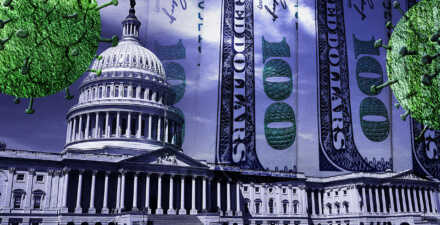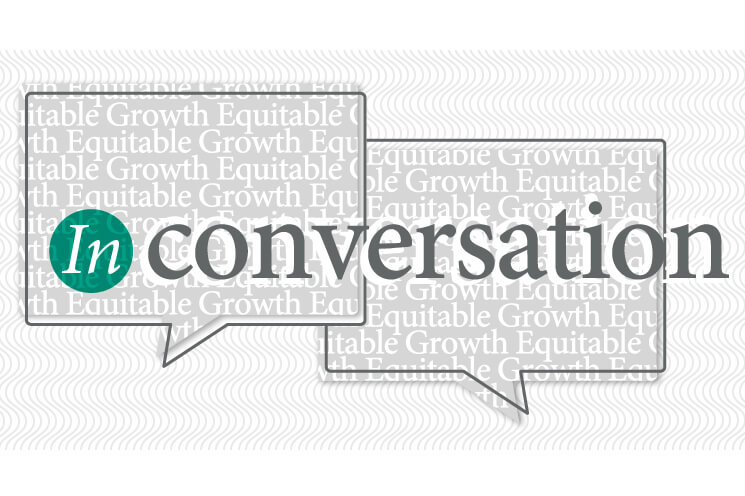Brad DeLong: Worthy reads on equitable growth, June 19-26, 2020
Worthy reads from Equitable Growth:
1. This is very much worth watching. David Mitchell, “Equitable Growth webinar will explore bold policies to ensure a broad-based economic recovery,” in which he previews the webinar that can be found here: “The recovery from the coronavirus recession must be different from the previous recovery … To have a chance of emerging on a stronger footing, with less economic and racial inequality and more sustainable economic growth, policymakers need to respond with robust, evidence-based measures that attack the underlying problems causing inequality and help achieve economic security for all. As part of our Vision 2020 initiative to ensure that the election-year economic policy debate focuses on big ideas grounded in the latest research, the Washington Center for Equitable Growth is hosting a webinar with top economic experts on June 25 to discuss the kind of bold policy initiatives that can help transform the U.S. economy … The first [panel], “Democratizing the Economy,” will focus on the need for new or drastically reformed institutions to address how financial institutions and the Federal Reserve have exacerbated inequality. The second, “Building Power for Workers and Families,” will describe how enhanced collective bargaining rights, public benefit and social insurance programs, anti-discrimination protections, and other power-building policies.”
2. Equitable Growth has launched a new monthly feature, “Expert Focus.” Please check out the most recent one by Christian Edlagan and Maria Monroe, “Expert Focus: Leading Black scholars on U.S. economic inequality and growth,” in which they write: “In this installment of “Expert Focus,” we highlight Black scholars whose cutting-edge research draws on the respective roles of history, power, and institutions … William A. Darity, Jr. [on] stratification economics, an approach to economics that focuses on economic disparities between persons, groups, and regions … Dania V. Francis [on] socioeconomic disparities in education, wealth accumulation, and labor markets [and] how to design and carry out a reparations program … Trevon D. Logan [on] historic links among intergenerational economic mobility, race, and the Black-White divide in income and wealth [and] school segregation, disinvestment from public goods, and divergent levels of investment in education since the 1950s [that] have combined to create a nexus of low mobility for Black Americans … Anna Gifty Opoku-Agyeman & Fanta Traore [on] the share of Black women awarded doctorates in economics … groups such as the Sadie Collective—co-founded by Opoku-Agyeman and Traore, a senior research assistant at the Federal Reserve Board—provide crucial support to help Black women thrive in fields where they are woefully underrepresented and where they can sometimes feel out of place … Jhacova Williams [on] the role of structural racism in shaping racial economic disparities in labor markets, housing, criminal justice, higher education, voting, and other areas.”
3. Back in the 1880s left-wingers and right-wingers; aristocrats, capitalists, and socialists; reactionaries and progressives could all come together and agree on demands for spending more money on better data and measurement in terms of economic statistics. Back then, all believed that their policies would be for the general good—in the long run at least. Today achieving consensus on investing in better data appears to be much more elusive. And that, I think, is incredibly worrisome. Read Heather Boushey and Somin Park, “The coronavirus recession and and economic recovery: A roadmap to recovery and long-term structural change,” in which they write: “Amid a pandemic and a steep and swift decent into recession, concerns about how policymakers calculate headline economic statistics may seem to be a misplaced priority. Yet … a continuing inability to fully appreciate and identify structural weaknesses in the U.S. economy for all workers and their families during the recession will make it even more likely that existing economic inequalities become further entrenched, to the peril of a more equitable economy emerging on the other side of the recession … Gross Domestic Product growth may once have been a reliable indicator … [but] many have been left behind over the past several decades … In an era where economic inequality has swelled to levels approaching those last seen nearly a century ago, policymakers need to know who is prospering from economic progress and who is suffering … The effectiveness of our policies to save the U.S. economy and ensure that growth is broadly shared depends on using the most precise measurements for today’s economy.”
Worthy reads not from Equitable Growth:
1. The bottom line appears to be that ending “lockdowns” in the United States will not produce rapid economic recovery. People have increased their savings substantially and are planning to do so next year, too, after the coronavirus pandemic has passed. Such an increase in savings requires an increase in planned investment spending (or in government public consumption spending) to maintain macroeconomic balance. But that maintenance of macroeconomic balance is not being greased by government action to make sure that that investment spending appears. And government consumption spending is not growing but shrinking as a new wave of austerity kicks in. But what about ending the lockdowns? Doesn’t that help? Probably not. Ending the lockdowns gets more people sick, which further raises savings. And the lockdowns themselves did not so much decrease spending as shift spending from nonessential (restaurants) to essential (grocery stores and take-out) spending categories. Read Simon Wren-Lewis, “Locking down too late but ending lockdown too early,” in which he writes: “The number of new infections is declining very slowly, which in turn means that most people will not return to previous patterns of ‘social consumption’ … [The] level of daily infections [at which] people will be happy to resume social consumption … is bound to be well below 17,000 … When I modeled the economic impact of a pandemic I was surprised at how much of aggregate consumption was social … The pandemic creates a huge demand shock even without any lockdown measures such as school closures. That is why many better-off households have been saving much more.”
2. I am sure that Vietnam missed some deaths, or that the ruling party regards reporting zero deaths as a boasting point to be maintained. But it looks as though as long as the country can maintain its 14-day quarantine requirement on those entering the country, the Vietnamese have this plague licked, and life can return to normal. Vietnam, New Zealand, Mauritius, and other nations, may well get out of this thing with the least economic damage. Read Jason Kottke, “Vietnam, Population 95 Million, Has Recorded 0 Deaths from Covid-19,” in which he writes: “Vietnam … recorded only 334 total infections and 0 deaths … on a 61-day streak without a single community transmission … They acted early and aggressively … [with] travel restrictions, closely monitoring and eventually closing the border … increasing health checks … Schools were closed for the Lunar New Year holiday at the end of January and remained closed until mid-May. A vast and labor-intensive contact tracing operation … sending everyone who entered the country—and anyone within the country who’d had contact with a confirmed case—to quarantine centers for 14 days.”
3. We have a Martin Luther King, Jr. holiday. We have Martin Luther King, Jr. elementary schools and statues. But White Americans, at least, do not pay enough attention to Martin Luther King, Jr., the man, and to what he thought, said, and did. Read Martin Luther King, Jr., “Letter from a Birmingham Jail,” in which he wrote: “While confined here in the Birmingham city jail … I think I should indicate why I am here … I have the honor of serving as president of the Southern Christian Leadership Conference, an organization operating in every southern state, with headquarters in Atlanta, Georgia. We have some eighty-five affiliated organizations across the South, and one of them is the Alabama Christian Movement for Human Rights. Frequently we share staff, educational and financial resources with our affiliates. Several months ago the affiliate here in Birmingham asked us to be on call to engage in a nonviolent direct action program if such were deemed necessary. We readily consented, and when the hour came we lived up to our promise. So I, along with several members of my staff, am here because I was invited here. I am here because I have organizational ties here. But more basically, I am in Birmingham because injustice is here. Just as the prophets of the eighth century B.C. left their villages and carried their “thus saith the Lord” far beyond the boundaries of their home towns, and just as the Apostle Paul left his village of Tarsus and carried the gospel of Jesus Christ to the far corners of the Greco Roman world, so am I compelled to carry the gospel of freedom beyond my own home town. Like Paul, I must constantly respond to the Macedonian call for aid. Moreover, I am cognizant of the interrelatedness of all communities and states. I cannot sit idly by in Atlanta and not be concerned about what happens in Birmingham. Injustice anywhere is a threat to justice everywhere.”







